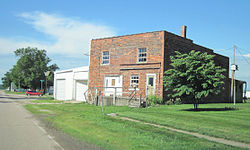20th century
The population was 125 in 1940. [13]
In 1971, Mr. James Cook submitted the following statement about the fertilizer plant which Atlantic Richfield Company (ARCO) was operating in Green Bay Bottoms to produce anhydrous ammonia and diammonium phosphate fertilizers, to a US Senate committee: "ARCO Chemical Co., Division of Atlantic Richfield Co., Fort Madison, Iowa, May 20, 1971. To the U.S. House of Representatives, Committee on Appropriations, Subcommittee of Public Works, the U.S. Senate, Committee on Appropriations, Subcommittee of Public Works:
ARCO Chemical Company, a division of Atlantic Richfield Company, operates and maintains a fertilizer manufacturing complex adjacent to the Mississippi River in an area known as Green Bay bottoms. The capital cost of the complex was in excess of $60,000,000 and is entirely protected from the Mississippi River by levees. The plant significantly contributes to the economy of Fort Madison, Burlington, and surrounding communities. This complex of ARCO Chemical Company does employ approximately 1,000 people who are engaged in the manufacture, distribution and marketing of fertilizers, almost all of which are manufactured at this one facility. Any flooding of the Mississippi River at this point would have a detrimental effect to the company, an economic impact on the aforementioned communities and the earnings of a significant number of employees. Therefore, ARCO Chemical Company supports the continuing study by the Corps of Engineers in regard to the raising of the levees along the Mississippi River. G. T. Stocking, Vice President" [14]
In 1976, the EPA reported that the ARCO Chemical Co. fertilizer plant in Fort Madison, IA, had a wet-process phosphoric acid unit, which had come on stream in 1968, had an annual capacity of 225,000 short tons, expressed as P2O5 [15]



